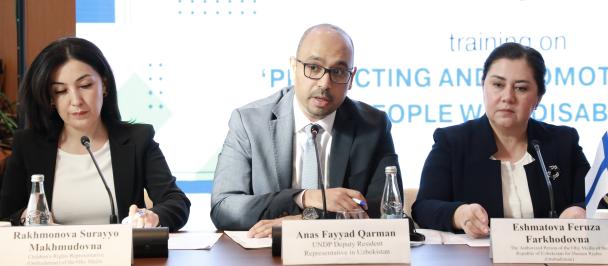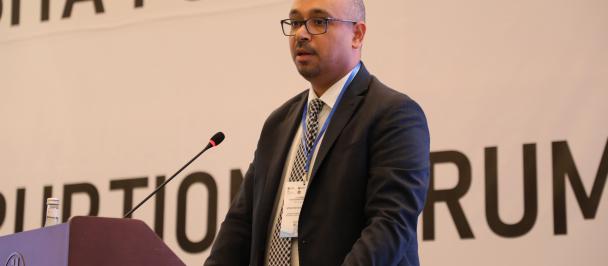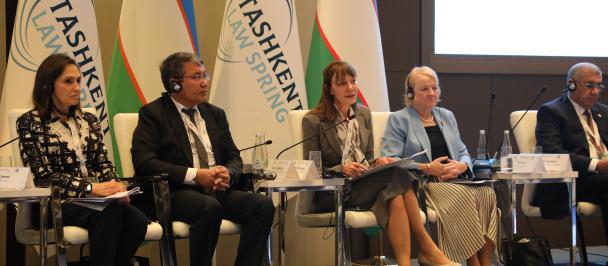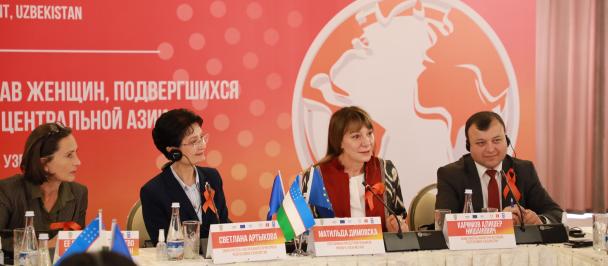Statement by Matilda Dimovska, UNDP Resident Representative in Uzbekistan at II Tashkent Anti-Corruption Forum
September 23, 2022

Muhtaram Narbaeva honim, aziz hamkasblar, xonimlar va janoblar! Assalomu alaykum!
UNDP is pleased to support and join the Second Tashkent Forum on Anticorruption.
As we said last year – we hope it will become a tradition as we are all interested in furthering of integrity, transparency, and accountability in Uzbekistan, for the sake of its sustainable development.
Six years ago, Uzbekistan embarked on the path of strategic reforms to advance its development.
Among other, the reforms focused on ensuring a fair and functioning legal system, rule of law and good governance as a cornerstone of successful reforms. Preventing and fighting corruption is a key component of this.
The Development Strategy of the New Uzbekistan for 2022-2026 is very much focused on anticorruption and aims to:
- fully implement Integrity standards in civil service,
- strengthen systemic preventive measures, especially in the sectors most prone to corruption, and
- form intolerance towards corruption in society.
We have been witnessing massive efforts on implementation of these priorities.
Several important laws on integrity were adopted: on combating corruption, on public procurement, on public oversight, and the latest but not less important – on civil service.
More than 10 anti-corruption by-laws, three biennale anti-corruption programs have been adopted over these years along with tools for implementation of these laws.
The Anti-Corruption Agency as the central coordinating authority as well as the anti-corruption compliance departments at the local level form a strong institutional framework for the new national anti-corruption system.
Gradual, but steady improvement of the country's position in various international ratings and indices, including Transparency International’s Corruption Perception, World Justice Project’s Rule of Law, World Bank’s Good Governance Indexes is a result of the work having been done.
However, there is still a long way to go.
We all see that there are a number of challenges to overcome on the way to sustainable development, corruption still being one of the most pressing.
It goes without saying that corruption negatively impacts social, economic and environmental dimensions of a country's sustainable development. I will refer to some of the recent data:
- Resources lost due to corruption annually in the country exceed 100 million US dollars. For example, in the first half of this year alone, the damage from corruption amounted to 60 million dollars.[1]
- The vast majority of identified corrupt officials - 99% - are employees of regional and district departments of government agencies.[2] Those with whom the ordinary people, vulnerable people encounter on a daily basis.
- For many years in a row, unfortunately, education, healthcare and banking are in the highest risk zone. For example, corruption crimes in education sector account for an average of 16% of the total number of crimes.[3]
- And this is just the tip of the iceberg, what law enforcement managed to identify. Latent, hidden corruption can exceed these figures by several times.
- So, under the facade of corruption, we face a systemic obstacle to the enjoyment of human rights[4], rule of law, gender equality, clean nature, and social and economic growth opportunities.
Therefore, it would be useful to lift the approach to the fight against corruption.
So that it is more systemic, comprehensive, aimed at triggering deep institutional changes, long -term results at three levels:
1) policy level – consolidation of Anti-corruption and Integrity Ecosystem - policies, laws, regulations at national level, in line with UNCAC and international standards. And importantly focus on their enforcement.
2) system level – Expanding anticorruption dynamics and integrity culture to sub-national and local levels with making local governments transparent and accountable. Also, experimenting with innovative and technologically advanced systems, institutions that will improve overall governance and address the functional, administrative, business inefficiencies. Harnessing best foreign practices and digitalization opportunities, but not only.
3) service delivery level – strengthening the integrity culture and professional ethics of civil service will improve the quality of services provided and citizens experience and satisfaction with the services received will improve.
And again, while further advancing on these, enhancing the demand side of the anti-corruption agenda, on which hinges the effectiveness of the entire anti-corruption work, should as well continue to be of primary focus. Which means empowerment of citizens, civil society, businesses and investigative journalists, promoting their essential role in anti-corruption efforts. Nurturing of a well capacitated civil society and citizens ready to argue and protect corruption free society.
I hope this Forum will be useful: to discuss the anti-corruption results and pressing challenges, to exchange ideas on advancing anti-corruption results and increase engagement of all sectors. And accelerate the formation of corruption-free Uzbekistan.
Thank you very much!
[1]https://www.inform.kz/ru/bolee-60-mln-dollarov-sostavil-uscherb-ot-korrupcii-v-uzbekistane_a3960439
[2]https://www.inform.kz/ru/bolee-60-mln-dollarov-sostavil-uscherb-ot-korrupcii-v-uzbekistane_a3960439
[3] https://www.gazeta.uz/ru/2022/08/05/senat-dispute/
[4]https://www.ohchr.org/sites/default/files/Documents/HRBodies/HRCouncil/AdvisoryCom/Corruption/OHCHR.pdf

 Locations
Locations


